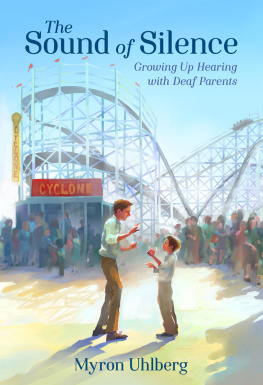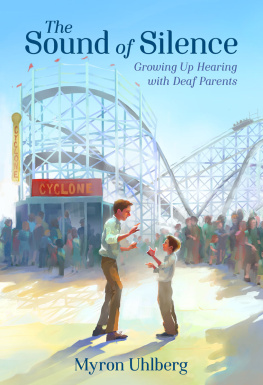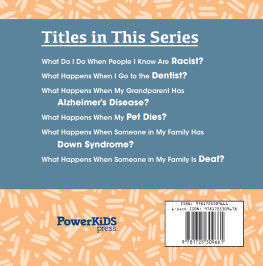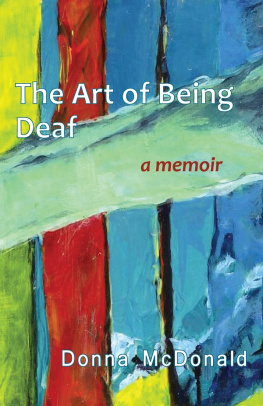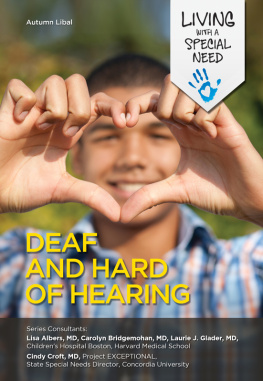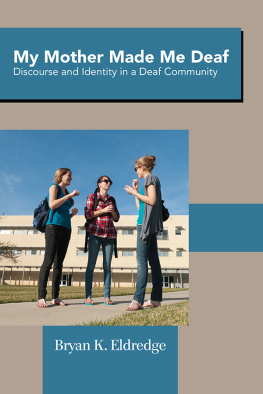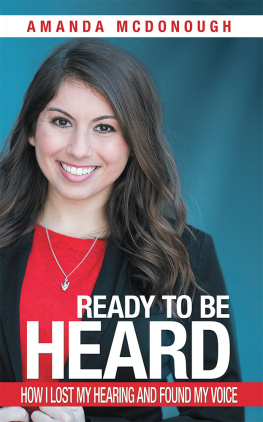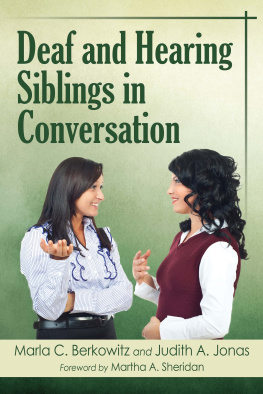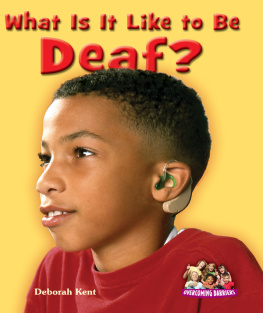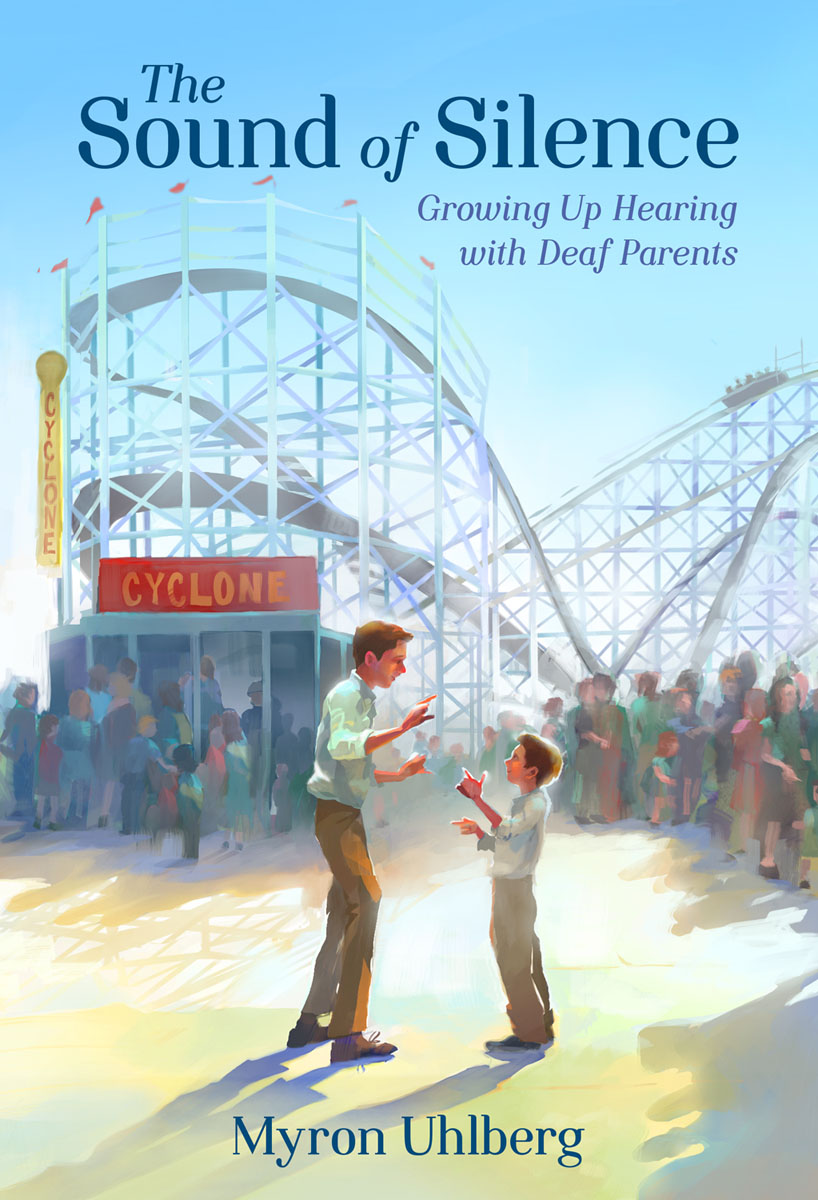
One family, two worlds.
As the hearing son of deaf parents, Myron Uhlbergs first language was sign. The first sign he learned was I love you, and even during the dark days of the Great Depression, his familys silent home was always filled with warmth and optimism.
Outside, things were different. American Sign Language was not recognized, and the deaf were often dismissed as unintelligent and ignored. So as Myron translated from sign to spoken English for his parents, he found himself caught between the world he grew up in and the world he would one day call his own.
In this young reader adaptation of his acclaimed memoir, Hands of My Father, Uhlberg tells of the daily strugglesand hidden joysof growing up in the middle. By turns heartbreaking and hilarious, his story is for anyone who has struggled to find a place to belong.
Albert Whitman & Co.
100 Years of Good Books
www.albertwhitman.com
Printed in the United States of America
Jacket art copyright 2019 by Albert Whitman & Company

Library of Congress Cataloging-in-Publication data is on file with the publisher.
Text copyright 2019 by Myron Uhlberg
Hardcover edition first published in the United States of America in 2019 by Albert Whitman & Company
ISBN 978-0-8075-3146-4
All rights reserved. No part of this book may be reproduced or transmitted in any form or by any means, electronic or mechanical, including photocopying, recording, or by any information storage and retrieval system, without permission in writing from the publisher.
This work is based on Hands of My Father: A Hearing Boy, His Deaf Parents, and the Language of Love, originally published by Bantam Books, a division of Random House, a subsidiary of Penguin Random House, in 2009.
Printed in the United States of America
10 9 8 7 6 5 4 3 2 1 BP 24 23 22 21 20 19
Cover art copyright 2019 by Albert Whitman & Company
Cover art by Carolyn Arcabascio
Interior design by Aphee Messer
For more information about Albert Whitman & Company, visit our website at www.albertwhitman.com.
100 years of Albert Whitman & Company Celebrate with us in 2019!
In memory of my parents, Louis and Sarah Uhlberg
Their grandchildren, Eric, Robin, and Ken
Their great-grandchildren, Alexandra, Kelli, Max, and Miles
With deepest gratitude to my wife, Karen
And in memory of my brother, Irwin
PART I

Apt. 3A
CHAPTER 1

Dramatic Welcome
Ive never liked being the center of attention. But in my family, I always have been, ever since I was born just after midnight on July 1, 1933.
Everything about that day was peculiar. For one, I came into this world during one of the biggest electrical thunderstorms in the history of Brooklyn, New York, where my parents lived. According to my father, on the night of my birth, giant fingers of lightning reached down from the sky and ignited oil tanks, which exploded, sending flames hundreds of feet into the sky and turning night into day. Then the clouds cracked open, releasing a flood of water on our neighborhood and turning Brooklyns wide avenues into raging rivers.
In the middle of all this chaos, my father ran out of Coney Island Hospital, where my mother was about to give birth, and howled at the sky like a banshee.
People sometimes say I get dramatic. I think it might be because of the dramatic circumstances of my birth. But there was another reason I was the center of attention that night. You see, both of my parents were deaf, and no one, not even the doctors, could say if I would be born deaf too.
When I finally arrived, the first words my father spoke to me, as I lay in my mothers arms, were with his hands. As a deaf man, my father had no words to speak. Instead, he introduced me into the world with joyous signs of welcome. His hands flashed in the air, quivering with excitement: Welcome! Welcome! Open your eyes! You are home now. And in the same way that many children start learning to speak from the moment their mother whispers I love you into their little ears, I began to learn my first language by watching my fathers hands through half-closed eyes.
My father was right. I was home. But unlike my parents, I could also hear the murmuring voices and the thunder outside the hospital window. And while I stepped with one foot into my parents silent world, my other tiny foot was born into another world. The world that I would one day call my own.
CHAPTER 2

A New Addition
My parents world was a four-room apartment on the third floor of a redbrick building, not far from Coney Island. And on certain summer days, when the wind was blowing just right and our kitchen window was open, I could smell the salty air of the Atlantic Ocean, sometimes even catching a hint of mustard and grilled hot dogs from Nathans Famous hot dog stand (although this part may have been my imagination).
On one of these afternoons, when I was old enough to understand sign, my father told me about the events that led him to plead to the sky on that crazy night. It was his story. But it is also the beginning of my story.
As always, my father spoke with his hands. His hands were his voice. And his hands contained his memories.
Like me, my father was born hearing. But at an early age, he had become very ill, so ill that his parents thought he would die. Fever ravaged his body for more than a week. And when it finally let up, he was alive, but he would never hear another sound for the rest of his life.
Not fair! he signed to me, his hands fast, angry. I could always tell, at a glance, my fathers moodshappy, angry, thoughtful, playful, seriousby paying careful attention to the way he signed. The signs sent the information, but the way he signed them told me more, like how an actor could make a character come alive, not by the words he said but by the way he said them.
My father told me that because both of his parents could hear, he could barely communicate with them. He shared only a few signs with his father: eat, be quiet, sleep. Each one was a command sign. There was no sign for love between them.
My father did share a sign for love with his mother. It was a home-sign, a sign she had created, and she used it often. My father told me that his language with his mother was poor in quantity but rich in content. She communicated less through signs than through the glow that appeared in her eyes whenever she looked at him. That look was special, for him alone.
When he was eight years old, my father was sent to live at the Fanwood School for the Deaf, a military-style school for deaf children. He thought his parents had abandoned himthat he was damaged. In his early days, he cried himself to sleep every night. But slowly he realized that he had not been abandoned. He had been rescued. For the first time in his life, he was surrounded by children just like him. He finally saw that he was not alone.
Next page
